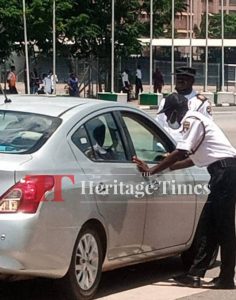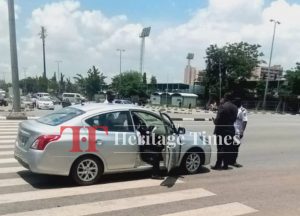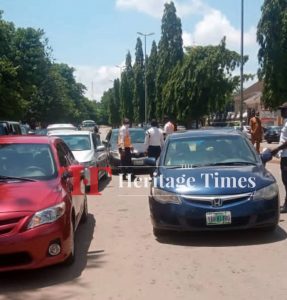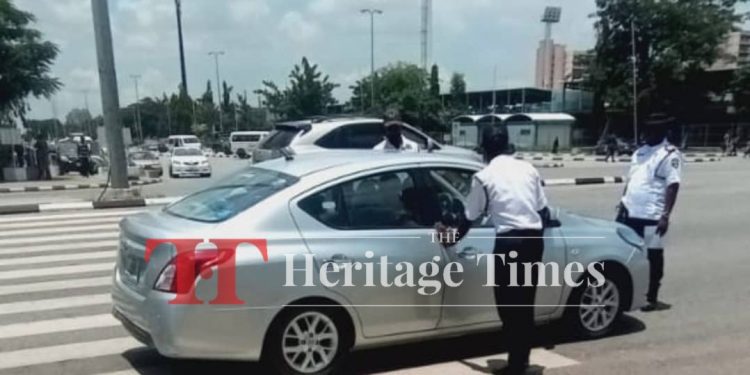By Emmanuel Nduka
The nuisance constituted on a daily basis by Vehicle Inspection Officers (VIOs) in Nigeria’s capital, Abuja, has reached disturbing levels, as the men in Black and White stop and inspect vehicles on the ever-busy highways, without paying respect to traffic lights and other road users.
On Tuesday, our correspondent saw a handful of the officers distorting traffic just in front of the Presidential Villa, even while traffic lights had signalled ‘go’ for other road users.

The ugly trend now leaves the nation in the hands of shame, as foreign diplomats stationed in the capital, see the VIO conduct their stop and inspect activity carelessly.

While the US has accused Nigeria of having identity problem in terms of gathering data of its citizens, the ugly trend rarely happens in other African countries like Ghana, Rwanda and South Africa, most of whom have sophisticatedly moved on to more advanced ways of evaluating vehicle validity.
Sadly, Nigeria has failed to solve its identity issue. Even with the NIN, BVN and other methodologies prescribed to ease gathering of citizen’s data, it has still struggled to achieve this.

In Rwanda, to inspect a vehicle, the registration procedures are completed online with the Rwanda Revenue Authority, with all agents having a unique login identification number. After the fulfilment of the necessary requirements online by the agents, the system generates a unique acknowledgement number to the clearing agent. The number is then copied and sent to the client who in this case, is the owner of the vehicle being registered. The acknowledged number is used to track the vehicle registration until it is approved.

If registration is approved, an auto-generated electronic mail is sent to the e-mail address specified for the agent with a copy to the associated company, organization, individual or owner. This in turn ensures that both the clearing agent and vehicle owner know the status of a car registration.
In South Africa, the Société Générale de Surveillance (SGS), one of the world’s leading testing, inspection and certification company, has specially trained SGS inspectors. While inspecting used cars, they register all technical information about a car, including the make, model, series, fuel type, trim and accessories. They ascertain the presence of keys and documentation, the condition of the tires, etc. They then note and photograph any damage.
The entire process is technologically driven. The data collected during the inspection is sent electronically to an SGS-proprietary application called VIMS (Vehicle Inspection Management System). Taking into consideration all the results of the inspection, VIMS provides a detailed cost analysis of every fault on the car. All these are done off the roads.
A VIO personnel who spoke with The Heritage Times on condition of anonymity, confided that their salaries are paid directly by government, but from the revenues they generate on the roads. “There is a way the work is, but if you are not in the system, you won’t understand it,” he said. What this means according to him, is that their bosses give them marching orders to go onto the roads to generate revenue at any cost.
In 2017, the Jabi area of Abuja was thrown into chaos, as customers at the popular Mr. Bigg’s restaurant in the area fled for safety, after a driver fleeing from VIOs crashed his car into the building.
According to eyewitnesses, an unnamed VIO personnel was dragging the steering wheel with the taxi driver, who was escaping arrest until the vehicle crashed into the building.
Also in 2017, Nigeria’s commercial city, Lagos State, under the leadership of Governor Akinwunmi Ambode, ordered VIOs off the state’s roads. The state government said the directive was temporary, and intended to enable them undergo training in the use of modern technology and retraining on courtesy in relating to the public.
The move however placed the role of the VIO under a searchlight. Later on May 16, the governor announced a “permanent” ban of the VIOs from roads in the state. The ban of VIOs in Lagos at the time, knitted perfectly into the state’s vision of a truly developed city, and the need to embrace good standards of governance.



































